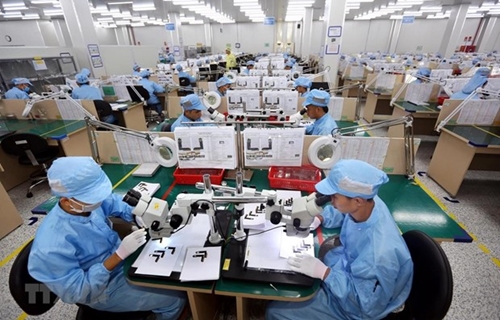While agriculture continues to be a dominant source of employment, much of Vietnam’s economic growth in the recent past has been driven by the services and industrial segments, according to the website.
    |
 |
|
Workers at an electronic products manufacturing firm in Vietnam |
One of the reasons that make Vietnam more attractive than other countries is its labour costs, which are half that of China and also considerably lower than its other manufacturing competitor – Mexico.
Seeking Alpha said Vietnam’s dominance lies in the electronics manufacturing (36 percent) followed by footwear. Some notable U.S. names that have recently made inroads into Vietnam include Sourcify, Cooper Tyres, and Key Tronic.
The website cited a survey conducted by the U.S. Chamber of Commerce which showed the rate of respondents selecting Vietnam as the primary choice for relocation grew from 17 percent in 2018 to 36 percent in 2019.
Vietnam’s export to the European Union (EU) is predicted to hit 60 billion USD by 2025. In the long run, it would be healthy for the Southeast Asian country to have a more diversified source of export customers and not rely on the U.S. and China alone, according to Seeking Alpha.
The EU-Vietnam Free Trade Agreement is expected to open up a market for Vietnam with a combined GDP of close to 2.2 trillion USD. According to the deal, tariff on Vietnamese products such as garments, computers, phones, apparel, footwear, textiles, general electronics, and farm devices will decline from 9.7 percent to 2 percent in 2025.
The website also mentioned the successful prevention of COVID-19 in Vietnam, which has had a limited impact on the local tourism compared to other destinations. It cited data from Vietnam as showing that in July 2020 more than 26,000 flights are expected to transport over 5 million people, representing annual growth of 16 percent and 24 percent, respectively.
Source: VNA